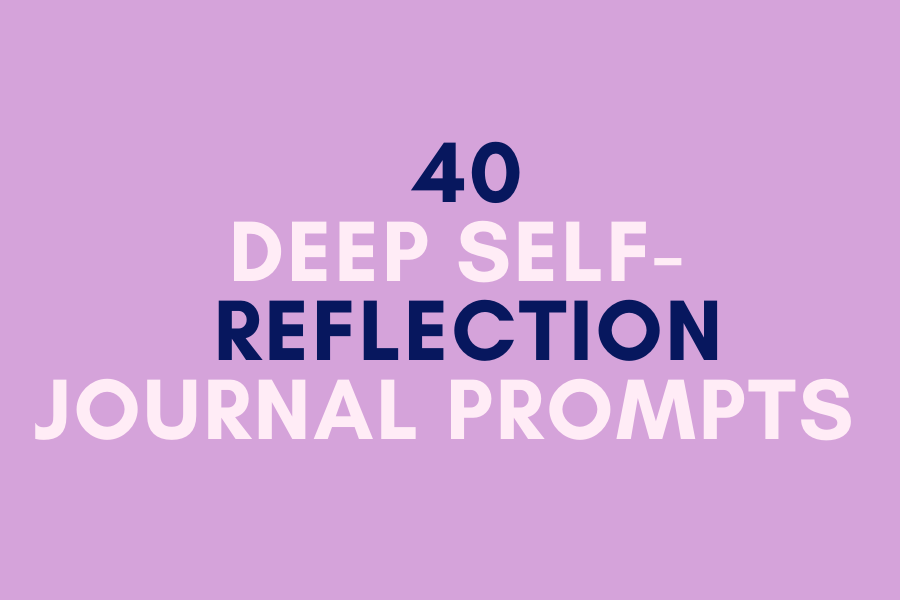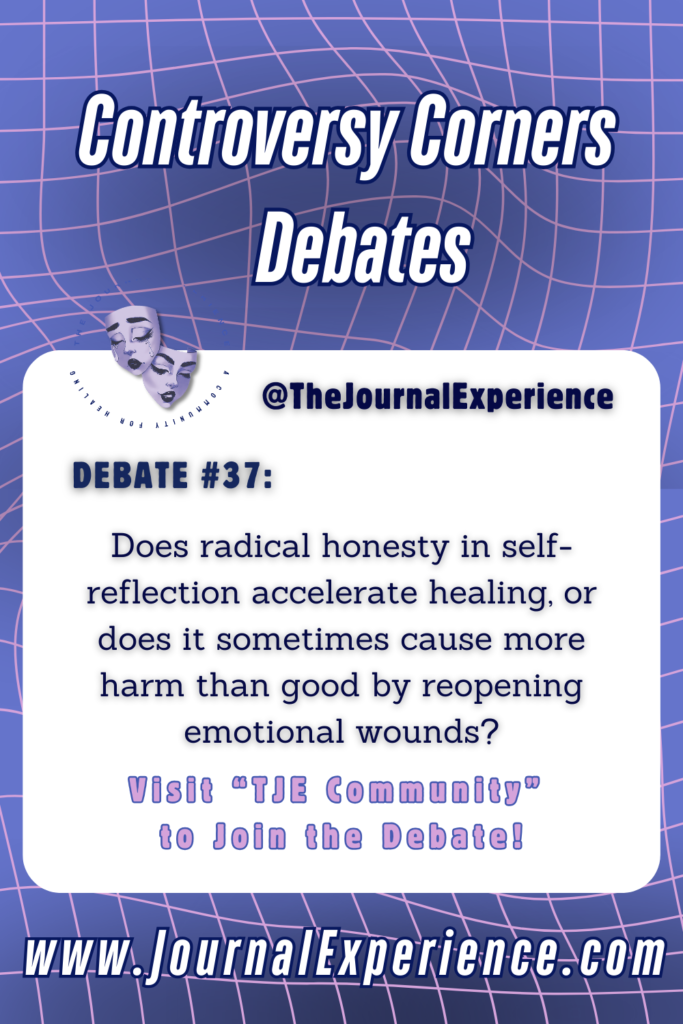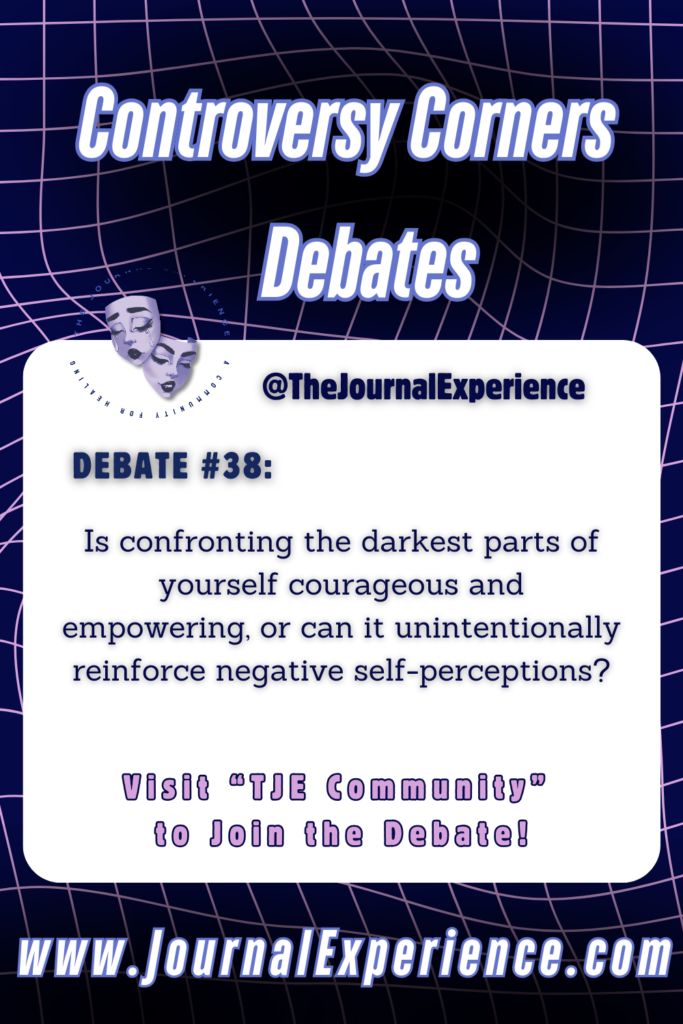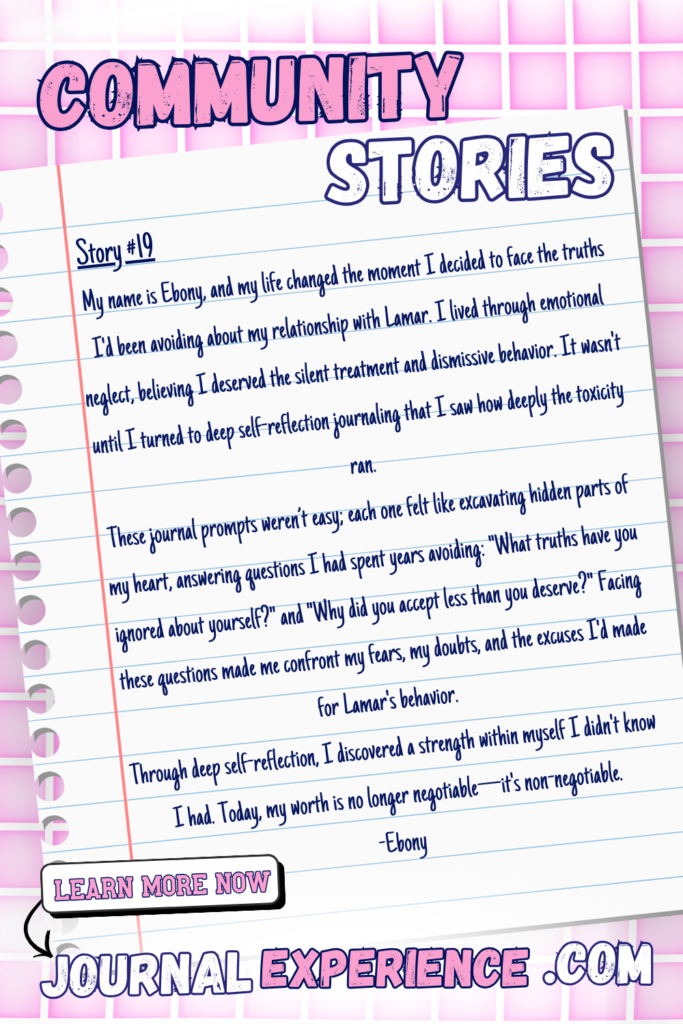
Surface-level journaling is a beautiful entry point to self-awareness. It helps us stay grounded, check in with our day, and name our feelings. But if you’re reading this, you’re probably ready for something more—a deeper dive. Deep self-reflection is where transformation truly begins.
This post is for those who feel called to go inward, beyond the surface of daily stressors, and into the layers of belief, pain, resistance, and wisdom that often go unnoticed. When we slow down enough to ask ourselves the hard questions—and brave enough to answer them with honesty—we start to uncover what’s been buried and what’s been waiting to heal.
Journaling is one of the most powerful ways to make sense of your internal world. With a pen and paper, you create a space to name your truth without fear of judgment or interruption. These 40 prompts are here to support your journey of deeper clarity, self-acceptance, and emotional release. They’re not just questions—they’re doorways into parts of yourself that deserve attention, compassion, and integration.
Guided Prompts For Honest Inner Work
Deep Prompts to Unlock Self-Awareness
We often avoid the truths that could liberate us. These prompts are invitations to sit with what’s been hidden—either consciously or unconsciously—and explore the edges of your identity, your patterns, and your personal truth.
Self-awareness isn’t just about identifying what you like or dislike—it’s about gently peeling back the layers that you’ve built to protect yourself. Often, those layers were necessary at one time. But now, they might be limiting your capacity to grow, connect, or truly be seen. These prompts are designed to help you get real with yourself—not in a harsh or judgmental way, but with curiosity and compassion.
Let this be a moment where you stop hiding from yourself. Not because you have all the answers, but because you finally feel ready to ask the right questions.
- What do I pretend not to know about myself?
- What parts of me am I still afraid to face?
- Where does my resistance come from, and what might it be protecting?
- When do I feel most like myself, and what brings that out of me?
- What truth about me do I struggle to accept?
- Who am I when I’m not performing for anyone else?
- What situations tend to bring out the version of me I don’t like?
- How do I act when I feel emotionally unsafe?
- In what ways am I abandoning my needs or desires?
- What do I most want to be known for—and why?

Emotional Healing Through Honest Reflection
Healing requires honesty—but not the kind that punishes or criticizes. This is about the kind of honesty that holds your hand, not your shame. It’s about naming what hurt, admitting what’s still tender, and being courageous enough to feel it without numbing, rushing, or pretending you’re already over it.
True healing happens when we allow ourselves to tell the truth about our pain. When we can look at our past with clarity instead of judgment. When we can meet our emotions with compassion instead of shame. These prompts are designed to help you do just that. To speak what hasn’t been spoken. To release what’s still clinging to your nervous system. And to begin writing the healing narrative you deserve.
- What emotion have I been avoiding, and why?
- What part of my past still feels tender, and what does it need from me now?
- When did I start believing I wasn’t enough?
- What guilt am I carrying that may no longer belong to me?
- What shame do I need to speak aloud—even if only in my journal?
- What moment in my life felt like a turning point, and how has it shaped me?
- What emotional need did I go without, and how does that show up today?
- How do I react when I feel emotionally unsafe, and what does that reveal?
- What part of me is still waiting to be seen, heard, or validated?
- If I could write a forgiveness letter (to myself or someone else), what would it say?
Personal Growth Through Radical Self-Honesty
Growth demands truth. Real, unfiltered, sometimes uncomfortable truth. It’s not just about checking off goals or achieving external milestones—it’s about facing your inner world with courage and curiosity. Radical self-honesty asks you to be accountable to yourself first. It requires dropping the masks we wear for approval, validation, or protection, and standing face-to-face with who we are becoming.
These prompts help you track your inner evolution, understand your values, and see how you’re changing through the lens of personal integrity and emotional accountability. Growth isn’t about being perfect—it’s about becoming more aligned with what feels true, right, and healing for you.
Use these questions as checkpoints to measure not just how far you’ve come, but how deeply you’ve chosen to live in truth.
- What beliefs am I currently outgrowing?
- How have I changed in the last six months?
- What emotional triggers am I beginning to understand more deeply?
- What behaviors do I engage in that no longer align with who I want to be?
- How do I handle being wrong, and what does that say about my growth?
- What boundaries have I started to enforce—and why?
- What does radical honesty mean to me?
- What personal values do I want to live by more consistently?
- Where in my life am I settling—and what would it take to shift that?
- What does it mean for me to live in alignment with my truth?

Incorporating Mindfulness Into Deep Reflection
Deep journaling can be intense—emotionally, mentally, and even physically. When you’re diving into long-held truths, unresolved emotions, or parts of yourself that haven’t had a voice in years, it’s important to stay grounded. Mindfulness acts as a bridge between your emotional depth and your present safety.
These prompts and techniques are designed to help you ground before and after your journaling sessions, creating space for emotional regulation, nervous system care, and intentional self-connection. Practicing mindfulness throughout your reflection helps you stay anchored while still exploring what’s real. It reminds you that you can go deep—and return to safety afterward. It’s not about staying in emotional intensity; it’s about visiting with intention and leaving with clarity.
- What helps me feel grounded before I begin deep reflection?
- How can I use my breath to support myself as I write?
- What does stillness reveal to me that movement hides?
- How does nature speak to my inner healing?
- What sound, smell, or setting helps me feel safe in my body?
- After deep journaling, how can I care for my nervous system?
- What physical sensations signal when I’m hitting emotional depth?
- How can I tell when I need to pause, step back, or return later?
- How does mindfulness support my emotional honesty?
- What ritual can I create to close each journaling session with softness?
Overview
Deep reflection is rarely easy—but it creates space for peace. It allows you to shed what you’ve been carrying and reconnect with who you truly are underneath the pain, pressure, or performance. The work may be heavy, but it’s also sacred. Every moment spent writing your truth is an act of radical self-respect.
These 40 prompts were designed to help you dive into truth, release shame, and invite clarity. Your story deserves to be written. Your pain deserves to be witnessed. And your healing deserves to be honored.

You don’t need permission to heal—you need space. And journaling offers exactly that: a safe, honest, and empowering space to grow. Let these prompts be the doorway to your next breakthrough.
Join The Journal Experience or subscribe to our newsletter for tools that meet you at the depth you’re willing to go. Inside, you’ll find guided prompts, trauma-informed resources, and a growing community dedicated to healing out loud.
You don’t have to heal in silence. Let your journal speak with you—and for you.
You’re not broken. You’re becoming whole.